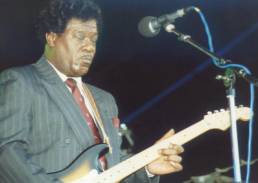
'Tales
From The Woods' raises a glass and says “Farewell” to New Orleans blues
guitarist/songwriter/singer Earl King who died in New Orleans on 17th
April 2003.
Born
Earl Johnson (or Solomon Johnson as at least one reference book states) in New
Orleans on 6th February 1934, as a young teenager, around the age of
14, was when Earl began to get really serious about the guitar. He was
infatuated with the sounds created by his blues guitar heroes that included
T-Bone Walker, Clarence Gatemouth Brown and the electrifying gospel sound of the
wonderful Sister Rosetta Tharpe. It was, however, the Mississippi born Guitar
Slim who was simply not just a musical influence but lit a fuse that fired his
imagination to create the persona that would become Earl King. Slim devised an
outrageous stage act that included dyeing his hair blue and green, often with
matching suits; he also possessed a remarkable guitar tone. Stunts like charging
through the audience and out into the street whilst still playing attracted the
attention of the young man.

Earl
King in 1990
By
the very early 1950s Earl had not only become a disciple of Slim but also a
close friend. In 1954 Slim was briefly sidelined from touring with Ray Charles
through a road accident and Earl was called in to deputise. Still using his name
(or the name of Earl Johnson), he cut his first track for the Savoy label in
1953, ‘Have You Gone Crazy’ which has another friend (and soon to be
yet another New Orleans legend) on piano, Huey Piano Smith.
He
moved next to Specialty where the label boss intended promoting his signing as
King Earl until a typesetter inadvertently reversed the name so, as fate
dictated, Earl King would be the name that would pass into blues history.
Several sides were recorded, still very much in emulation of Guitar Slim,
including ‘A Mother’s Love’ in 1954. It was with the Ace label a
year later that he would have success; although only a regional hit the song
would be forever associated with him - ‘Those Lonely, Lonely Nights’
(1955).
1960
would See Earl label hopping once again, this time to Imperial. Under the
guidance of the great Dave Bartholomew King enjoyed R&B hits with ‘Trick
Bag’ (1961), allegedly the story of his pianist father’s attempts to
tame a wild woman, and in 1962 ‘Always A First Time’. Around the same
period he wrote ‘Big Chief’ for Professor Longhair; throughout his
long career he wrote material for many artists, often reading like a who’s who
not just of the Crescent City artists but blues and R&B acts generally. Fats
Domino, Lee Dorsey, The Dixie Cups, Dr John, The Neville Brothers, Stevie Ray
Vaughan and many others all benefited from his songwriting skills. Arguably his
most famous song ‘Come On (Let The Good Times Roll)’ was featured on
Jimi Hendrix’s 1969 album ‘Electric Ladyland’.
Earl
King was nobody’s fool; unlike so many of his generation he retained full
publishing rights to all of his material and when the going got tough through
much of the 1970s as it did for many blues artists he had little to worry about,
simply living off the royalty cheques. Often his writing wandered afield from
conventional blues structures as can be heard on examples such as ‘Time For
The Sun To Rise’ and conventional subject matter ‘Mediaeval Days’.
He also filed many long hours as a session guitarist. The 1980s would find Earl
back on track working with the Rhode Island based band Roomful Of Blues on an
album entitled ‘Glazed’ that won a Grammy nomination in 1986. Four years
later on the Blacktop label came the acclaimed ‘Sexual Telepathy’ and
again on Blacktop in 1993 with ‘Hard River To Cross’.
The 'Tales From The Woods' editorial board witnessed Earl King in action a few times during the course of the 1990s; very early in that decade on a humid summer’s evening at London’s world famous 100 Club and a few years later a couple of hundred yards away in Charing Cross Road at the Astoria (whose future seems to be very much in the balance). On this wonderful evening Earl was part of a package that included the New Orleans soul queen Irma Thomas and, heading the bill, Bobby “Blue” Bland. Towards the end of the decade he was playing on his home territory at the New Orleans Jazz and Heritage Festival. Earl is gone but he would still want us to let the good times roll.